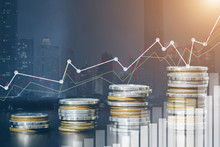The US economy is currently facing a period of uncertainty.
In the first quarter, GDP growth experienced a more significant slowdown than anticipated. Many companies are now announcing large-scale layoffs, adding to the economic concerns. Although inflation has moderated somewhat, it remains at high levels, leading to uncertainty about the extent to which the Federal Reserve will raise interest rates.
In addition, regional banks have been hit by turmoil. Silicon Valley Bank collapsed recently, and there are concerns that First Republic Bank could be the next to face difficulties. The previously established consensus view on the US economy has become less clear and more volatile. To provide some perspective, here are the opinions of three prominent economists regarding the current state of the US economy.
David Rosenberg
The ex-chief economist for North America at Merrill Lynch has made a prediction that the United States will enter a recession by September. Additionally, he foresees a potential 20% decline in stock prices and warns of the negative impact of a credit crunch.
In a recent interview to a podcast, the founder of the Rosenberg Research Foundation – David Rosenberg offered crucial inputs:
- “I don't think there are enough rate cuts priced in for next year. There's a serious risk we're going back down to the zero bound in a recession that ends up destroying demand and causing inflation to decline.”
- “A recession is a very big call because it's a haircut to national income. It's as if the whole country takes a pay cut. It is not that we take the Lamborghini from 80 down to 20. It's that we go in reverse.”
- “It was like the Energizer Bunny — it gave us a little bit more juice. But to say that we're not going to have a recession because of lagged impacts of fiscal stimulus from two years ago is ridiculous. The leading indicators are telling me that the recession is actually starting this quarter or next quarter. It's certainly not a 2024 story.”
Jeremy Siegel
The professor from Wharton cautioned against being deceived by the current positive earnings season, as the US economy is currently experiencing a credit crunch.
“The impact is there, it's just not in the data yet,” Siegel told CNBC of first-quarter financial results.
In his weekly client notes, he added:
- “I still believe the cumulative effect of tightening rates and the banking reverberations will slow things down dramatically and make it hard for the stock market to break out from these high levels it has reached several times before.”
- “I remain uncharacteristically cautious until the Fed ‘gets it' and not only pauses but says it is starting to look at rate cuts. I believe the real interest rate is too high to sustain normal growth at this point in the cycle.”
Mohamed El-Erian
The chief economic advisor at Allianz emphasized the need for major institutions, such as the Federal Reserve, to promptly adjust their strategies in response to this unparalleled macroeconomic environment.
- “Markets will punish companies and their managements if they do not adapt. Indeed, we are likely to see more financial stress and bankruptcies for businesses lacking resilience, as well as those with operating approaches that are not easily adaptable to a world of higher rates for longer. The latter includes commercial real estate whose moment of truth will materialise as more than $1tn of holdings need to be refinanced in the next 18 months.”
- “Without [adaptability], the steadying and guiding role of US institutional maturity will weaken even faster in the face of eroding credibility, turning this once dominant US comparative advantage into an even greater source of domestic and global instability.”























